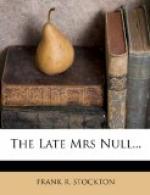Old Mrs Keswick was kind to him, but grave, and rather silent. Once she passed the open door of the parlor, by the window of which sat Miss Annie and Lawrence, deeply engaged, their heads together, in studying out something on a map, and as she went up-stairs she grimly grinned, and said to herself: “If that Null could look in and see them now, I reckon our young man would wish he had the use of all his arms and legs.”
But if Mr Null should disapprove of his wife and that gentleman from New York spending so much of their time together, old Mrs Keswick had not the least objection in the world. She was well satisfied that Mr Croft should find it interesting enough to stay here until the time came when he should be able to go to Midbranch. When that period arrived she would not be slow to urge him to his duty, in spite of any obstacles Mr Brandon might put in his way. So, for the present, she possessed her soul in as much peace as the soul of a headstrong and very wilful old lady is capable of being possessed.
CHAPTER XXIV.
The letter which Lawrence Croft had written to Junius Keswick was not answered for more than a week, and when the answer arrived, it did not come through the Howlett’s post-office, but was brought from a mail station on the railway by a special messenger. In this epistle Mr Keswick stated that he would have written much sooner but for the fact that he had been away from Washington, and having just returned, had found Mr Croft’s letter waiting for him. The answer was written in a tone which Lawrence did not at all expect. It breathed the spirit of a man who was determined, and almost defiant. It told Mr Croft that the writer did not now believe that Miss March’s acceptance of the said Mr Croft, should be considered of any value, whatever. It was the result of a very peculiar condition of things, in which he regretted having taken a part, and it was given in a moment of pique and indignation, which gave Miss March a right to reconsider her hasty decision, if she chose to do so. It would not be fair for either of them to accept, as conclusive, words said under the extraordinary circumstances which surrounded Miss March when she said those words. “You asked me to do you a favor,” wrote Junius Keswick, “and, very much against my inclination, and against what is now my judgment, I did it. I now ask you to do me a favor, and I do not think you should refuse it. I ask you not to communicate with Miss March until I have seen her, and have obtained from her an explanation of the acceptance in question. I have a right to this explanation, and I feel confident that it will be given to me. You ask me what I truly believe Miss March meant by her message to you. I answer that I do not know, but I intend to find out what she meant, and as soon as I do so, I will write to you. I think, therefore, considering what you have asked me to do, and what you have written to me, about what I have done, that you cannot refuse to abstain from any further action in the matter, until I am enabled to answer you. I cannot leave Washington immediately, but I shall go to Midbranch in a very few days.”




